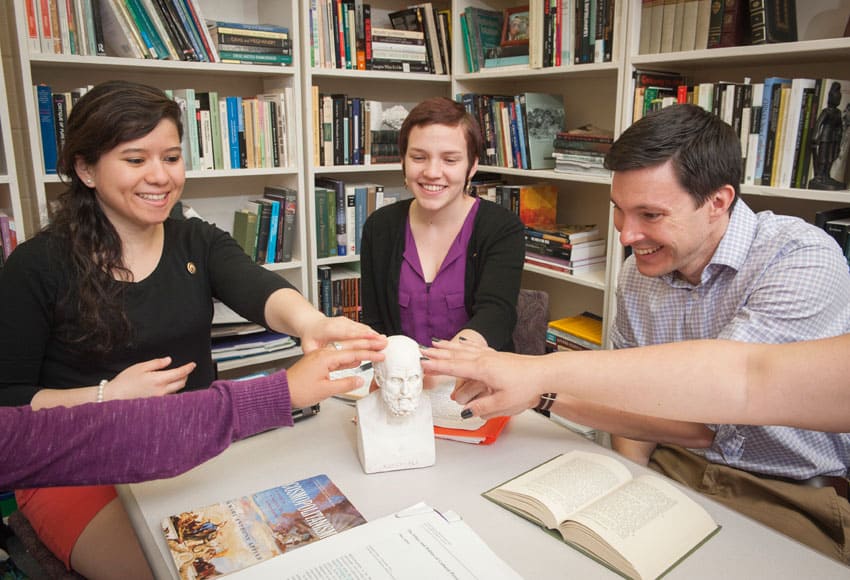Religion and Philosophy Preps Thinkers for the Real World

Schools of philosophical thought took centuries to evolve. At Converse, the Department of Religion and Philosophy has exploded with renewed life within the last decade, propelling philosophy to become one of the College’s fastest-growing majors. And in a moment just short of transcendency, the department received one of the nation’s most prestigious awards: An Arthur Vining Davis Foundation grant to support the development of an Interfaith Studies Program.
Converse has come a long way from the days when, as department chair Dr. Kevin DeLapp explains, “Philosophy had been kind of a latent minor. We hadn’t had a full-time philosopher on staff for almost 15 years, and no major in 40 years.”
DeLapp joined the faculty in fall 2006, his endowed chair position having been created in honor of President Fleming’s father, Dr. Harold E. Fleming, a Spartanburg physician who died in 2009.
“Dr. Harold Fleming was a lifelong believer in the power of philosophy, that it’s at the heart of the liberal arts, and that it was something that had been missing from Converse,” DeLapp says. “I don’t think we would have received this grant if our department hadn’t flourished so much over the last 10 years.”
While philosophers are often pegged as ponderers – seeing many sides to every issue – there’s no question about the relevance of philosophy and religion degrees in today’s marketplace. In fact, many business leaders are speaking up on the value of a liberal arts education.
In the wake of a U.S. presidential candidate’s recent comment in fall 2015 that “we need more welders than philosophers,” fact-checkers went all Socratic. They cited a salary database showing graduates with bachelor’s degrees in philosophy earn $97,000 a year, while welders with associate’s degrees take home less than $60,000 annually. Moreover, philosophers increasingly fill the employment ranks of megacompanies like Google and Apple.
“I think if you have a good understanding of life, culture and society, you have a good perspective on starting a business, instead of an education purely in business,” Flickr co-founder Stewart Butterfield told University of Victoria students. “You can always pick up how to read a balance sheet and how to figure out profit and loss, but it’s harder to pick up the other stuff on the fly.”
That “other stuff” is a way of life for the Department of Religion and Philosophy. Faculty help students to develop strong critical thinking skills that can be applied to a wide variety of professions.
Adjunct Instructor Bailey Szustak ’13, a philosophy and studio art major with a minor in art history, completed an internship her senior year with The Johnson Collection, a Spartanburg-based collection of art from or inspired by the American South. The internship, initiated by DeLapp, was a unique opportunity for Szustak to combine all of her areas of study, and to approach both philosophy and art from a different angle of entry.
“Philosophy teaches us how to break down abstract and complex ideas and apply them in the real world, enabling stronger reasoning and comprehensive understanding. This ability to “think well”–and to communicate those thoughts clearly and effectively—is essential for success in any field,” Szustak says.
Associate Professor of Religion Dr. Kyle Keefer agrees. “The role of the department has been largely one of challenging students at personal and intellectual levels in their exploration of the world’s major religious and philosophical traditions. The College has really moved toward trying to live out the Founder’s Ideal of being truly, but liberally, Christian.”
Originally published in The Converse Magazine